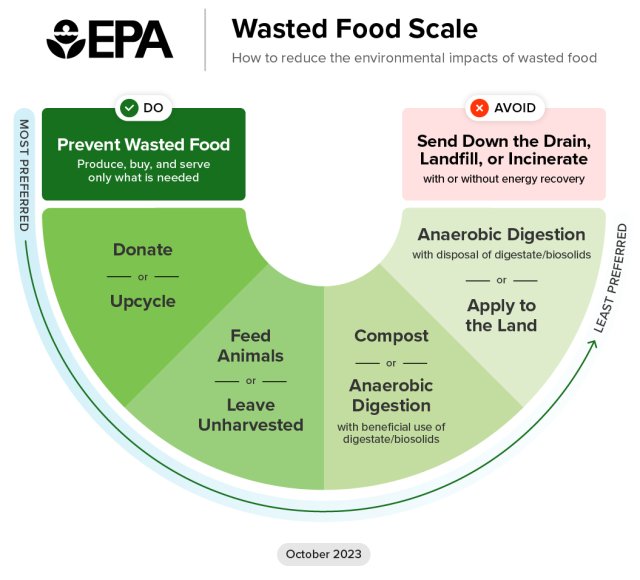Reduce Wasted Food by Feeding Animals
On this page:
EPA's Wasted Food Scale
Turning Wasted Food into Animal Feed
Feeding Animals is in the third tier of EPA's Wasted Food Scale. Farmers have been doing this for centuries. Food scraps nourish animals which in turn nourish humans, keeping wasted food within the human food supply chain. Feeding food scraps to animals reduces the amount of conventional animal feed that needs to be grown and processed and reduces the environmental impacts associated with that feed production. Turning wasted food into animal feed can also save farmers and companies money as it can be cheaper than hauling wasted food to a landfill. Companies can also provide food scraps to producers that make animal or pet food. There are many opportunities to feed animals, help the environment and reduce costs.
Contact your local solid waste, county agricultural extension office or public health agency for information. Determine what types, how often, and the amount of food scraps you can provide.
Wasted food can be fed to animals directly (following appropriate guidelines (pdf) (143 KB)) or converted to animal feed through a variety of processes, such as rendering or black soldier fly farming. Rendering involves heating and separating whole animal carcasses, animal by-products, and grease and used cooking oil into purified fats and protein meal. Companies can use the purified fats and oils in cosmetics or further refine them into biodiesel, while others may feed animals the protein meals. Black Soldier Fly farming is a system where Black Soldier Fly larvae consume and process organic waste, such as food scraps and manure, into high-value products like animal feed and organic fertilizer.
Legal Basics
Be sure you know how to handle your food scraps properly. Refer to the Swine Health Protection Act.
Leftovers for Livestock: A Legal Guide for Using Excess Food as Animal Feed(pdf) (7.8 KB), written by the Harvard Food Law and Policy Clinic and the Food Recovery Project at the University of Arkansas School of Law, describes different federal and state laws, regulations and requirements for feeding food scraps to animals. The guide also offers suggestions to generators of food scraps and to animal feeding operations.
Regulations vary in each state. Some states ban food donation for animal feed. Other states regulate what can be donated (often no meat or dairy).
Success Stories
Disclaimer of Endorsement: Reference herein to any specific commercial products, process, or service by trade name, trademark, manufacturer, or otherwise, does not necessarily constitute or imply its endorsement, recommendation, or favoring by the United States Government. The views and opinions of authors expressed herein do not necessarily state or reflect those of the United States Government and shall not be used for advertising or product endorsement purposes.
Rutgers University
Rutgers University in New Jersey is a leader in keeping food scraps out of the landfill. The dining halls at Rutgers partners with a local farm, Pinter Farms. Pinter Farms collects about one ton of food scraps every day from Rutgers' four main dining halls and feeds it to the farm’s hogs and cattle. Diverting food scraps to Pinter Farms costs Rutgers half the price of sending the scraps to the landfill. View a fact sheet about Rutgers' program.
MGM Resorts International
MGM Resorts International has been reducing wasted food going to landfills since 2007. Many of their food scraps from Las Vegas Strip properties go to RC Farms, a pig farm with 3,000 pigs. RC Farms follows state requirements by cooking food scraps first before feeding them to the pigs. Learn more about MGM Resorts efforts in this article on Biocycle's website.
Visit Success Stories in Reducing Waste to search for other waste management successes.

